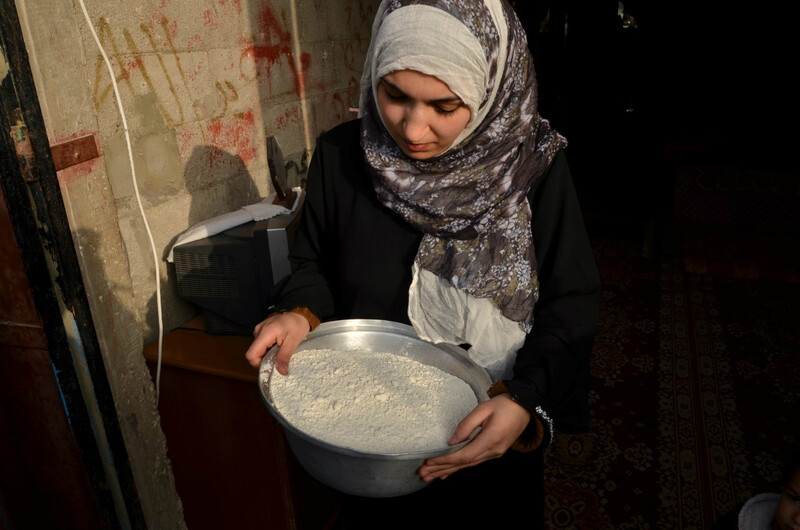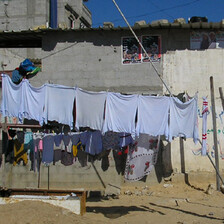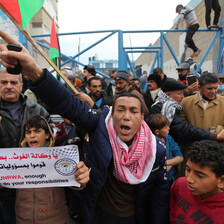The Electronic Intifada Gaza Strip 14 March 2014

Zainab al-Braim was informed that her food aid, including flour and other staples, will stop.
The Electronic IntifadaThrough a text message on her mobile phone, Naima Abu Hasanin learned that she will stop receiving food aid.
The message came from the UN agency for Palestine refugees (UNRWA), which told the single middle-aged woman from the southern Gaza Strip city of Rafah that she was no longer categorized as poor.
Abu Hasanin is mystified as to how the agency arrived at that decision.
A few weeks ago, she was asked to fill in a means-testing questionnaire by UNRWA. “In this one-room home, this table has been here for ages, since the time of my mother, may she rest in peace,” she said.
“This refrigerator is already old. Its door is no longer opening and shutting, so I managed to lock it with a regular door lock. You see how rusty it is. Is it because my little home looks tidy that I have become that rich?”
Abu Hasinin had been receiving flour, cooking oil, sugar and canned beef from UNRWA. By April, these rations will be cut off.
Few possessions
Unable to find regular work, Abu Hasinin is dependent on assistance from the local authority to pay her fuel and grocery bills. The food aid from UNRWA has helped supplement that assistance.
Although she has few possessions, she considers herself lucky that her home is not rented, as she inherited it from her parents.
Thousands of others in Gaza also face aid cuts.
The food rationing program was introduced in 2000 to assist those affected by Israel’s decision to close the boundary separating it from the Gaza Strip. The result of that move was that people living in Gaza were no longer allowed to travel into present-day Israel for work.
The cuts to the program are taking place at a time when poverty is on the increase.
UNRWA’s own data indicate that the proportion of households deemed “food insecure” in Gaza rose from 44 percent in 2011 to 57 percent the following year.
Cash shortfall
But the agency has struggled to maintain its services because of financial constraints. Last December, UNRWA stated that it faced a cash shortfall of $65 million in its 2014 budget.
More than 800,000 people in Gaza already receive food aid from UNRWA, which has predicted that the number who need such assistance could be almost 1 million this year (“UN: Nearly 1 million Gazans to need food aid in 2014,” Haaretz, 18 December 2013).
Adnan Abu Hasna, an UNRWA spokesperson, told The Electronic Intifada that the problems have been exacerbated because of the siege imposed by Israel and Egypt’s destruction of tunnels used to bring much-needed supplies into Gaza.
“What we are doing is to find the most needy people in order to help them,” he said.
According to Abu Hasna, the agency would welcome appeals from those affected by the cuts to rationing and would examine each appeal individually.
Many people in Gaza have complained about the criteria the agency appears to use as part of its means-testing.
“Desperate for a job”
Zeinab al-Braim and her family live in a partly-built store in the town of Bani Suheila. Her husband used to work on the Gaza-Egypt border but has been unemployed since last summer because of the destruction of the tunnels.
She, too, has received a text message informing her that the food aid will stop. The text followed a visit from the agency.
“The UNRWA social worker sat on this bed and started writing on a sheet, while she was looking around this home,” she said.
Al-Braim suggested that the decision to cease the aid may have been based on the fact that her family had an old refrigerator that her parents had given her.
“I am an unemployed university graduate,” she said. “And I am desperate for even a temporary job.”
Hussam al-Issawi, a resident of Nuseirat refugee camp in central Gaza, accused UNRWA of overseeing an “injustice.”
“UNRWA must be responsible for our welfare as a people whose homeland has been occupied,” he added.
For the past decade, he has been suffering from heart complications. As he is unemployed, food aid from the agency is vital to his survival.
UNRWA’s Abu Hasna told The Electronic Intifada that the agency expects the number of people seeking food aid to increase in the coming months by 20 percent, “so it will reach a million refugees — which has not happened in decades.”
He added that UNRWA is now implementing the results of its poverty survey.
He said that UNRWA “informed 58,736 families that there will be a change of statuses” either negatively or positively regarding food aid.
“34,258 families were informed that the agency will reduce or stop the aid it delivers to them, [while] 24,478 families were informed that there [will be] a positive change in their statuses — which means that the assistance will increase.”
Abu Hasna explained that 46,838 families were informed that nothing has changed in their status, and they will receive the same aid that they had received before.
He said that 7,480 new families joined the list of those who will receive aid in the round of food distribution beginning in April.
“All the measures were taken to reach the real needy people, and not because of budget cuts,” Abu Hasna said.
Shukri al-Arouqi, who sits on a committee of the Palestine Liberation Organization dealing with refugee issues, has been involved in protests that have taken place at UNRWA offices in a number of Gaza’s refugee camps.
He explained to The Electronic Intifada that the current UNRWA-led cuts in food rations had deprived at least 5,000 impoverished refugee households of their right to a “yellow” coupon, which is double the value of the common “white” coupon.
A “yellow” coupon provides an individual recipient with flour, sugar, rice, cooking oil, powdered milk and canned beef, distributed every three months.
Al-Arouqi added that the number of beneficiary households of UNRWA’s food assistance program is expected to stand at only 60,000 by the end of 2014.
“We are certain that the cut-off will continue, as we have learned that 13,000 cases are now under [consideration] by UNRWA,” he remarked.
“We are going to step up our protests until the people’s right to the food ration program is restored.”
Rami Almeghari is a journalist and university lecturer based in the Gaza Strip.





